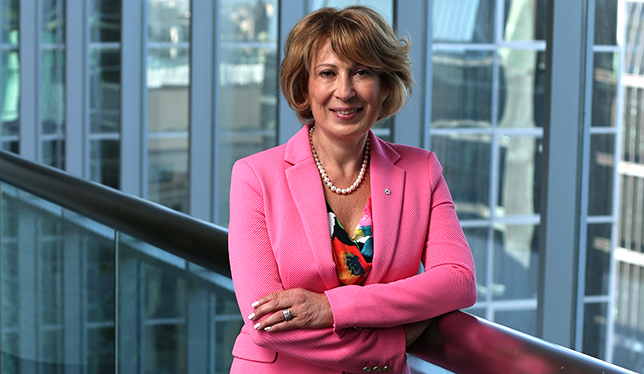Canada’s chief science advisor, Mona Nemer, will soon be working with a youth council made up of young people aged 18 to 30 from a broad range of backgrounds – not just students and young researchers. Over 1,100 Canadians have shown an interest in sitting on the council, which will have around 20 members.
“We are looking for candidates who are able to take a broad view of scientific and social issues,” said Dr. Nemer. “We will be selecting young people of various ages and backgrounds, but who all share a real interest in exploring the links between science and society.”
Youth involvement in governance
Joining the board of directors for the Medical Research Council of Canada (since replaced by the Canadian Institutes of Health Research) was what kickstarted her own career around the time she turned 40, said Dr. Nemer. “There I learned how the system works for researching and developing public policy, and I feel I had the opportunity to make a valuable contribution as a young researcher,” she said.
Through this experience, Dr. Nemer deems youth involvement in research and science governance as crucial, especially since young people are most affected by the decisions of today as they build the world of tomorrow. The youth council will make recommendations regarding the chief science advisor’s ideas and positions, such as on developing a culture of science among young people. There will also be room to identify pressing concerns and invite the scientific community to consider these issues.
A similar initiative in Quebec
The chief scientist of Quebec, Rémi Quirion, has had the support of his own intersectoral student committee since 2013. Young bioethicist Jean-Christophe Bélisle-Pipon serves as the committee’s interim chair.
“The intersectoral committee’s mandate is to contribute to the excellence of the next generation in research, and help broaden its international influence and improve access to research financing,” said Dr. Bélisle-Pipon. One of its first mandates was to increase the grant amounts from Quebec funding agencies and to align some of their procedures, such as for parental leave.
The committee has enjoyed increasing autonomy over the years and can now draw up its own action plan. Its initiatives this year include working on college-level research, the status and living conditions of postdoctoral fellows, and the transfer of knowledge obtained from research to the next generation.
Dr. Bélisle-Pipon said he is excited for the new federal youth council. He also hopes to see federal funding agencies designate a position on their board of directors to a member of the next generation of scientists, as is done in Quebec. The federal government recently named Brianne Kent as the first early career researcher to join their governing council of CIHR.
An opportunity to learn
Dr. Quirion also views the future youth council as a great initiative. “The contribution of our student committee has surpassed my expectations,” he said. “It works very rigorously and produces results, as we saw with the project to increase the grant amounts from funding agencies.”
The challenge Dr. Nemer faces right now is sifting through the hundreds of promising candidates. Dr. Quirion said she should expect more challenges in the future; youth committees tend to have high turnover rates, especially since they have an age limit for their membership. This does not apply in Quebec, where committee members are selected for their student status rather than their age.
Dr. Quirion would also like to see universities and host laboratories give more recognition to involvement in such initiatives, which is currently seen as secondary to writing theses and dissertations. “The knowledge young people gain on these committees will serve them throughout their careers, while contributing in a concrete way to improving the country’s research system,” he said.
